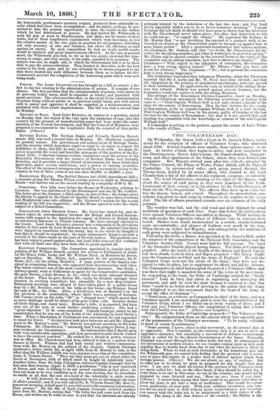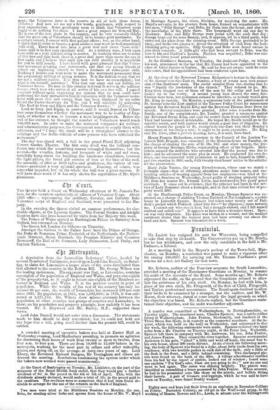THE VOLUNTEERS' DAY.
On Wednesday, the Queen held a Court in St. James's Palace, exclu- sively for the reception of officers of Volunteer Corps ; who mustered about 2500. Several hundreds were unable, from various causes, to at- tend. At twelve o'clock, they began to arrive, and were conducted to the Drawing-room, Queen Anne's-room, the Guard-chamber, Banquet- room, and other apartments of the Palace, where they were formed into companies. Her Majesty arrived soon after two o'clock, attended by the Prince Consort, the Prince of Wales, Prince Alfred, and the Duke of Cambridge. In preconcerted order, each group passed through the Throne-room, headed by its senior officer, who handed to the Lord Chamberlain a list of the officers in his regiment, company, or sub-divi- sion. The Lord Chamberlain, standing on the right of the Queen, read aloud the names of each group as they were presented by the Lord- Lieutenant of their county, or in his absence by the Under-Secretary of State for the War-Department. The officers then drew up in a line be-
fore the Queen, bowed, and retired. Throughout the presentation, pre- cedence was given to each corps by reference to its number in the Army List. The list of officers presented extends over six columns of the daily journals.
The weather was bad, and the cold wind and sleet thinned the usual multitude of spectators at such fetes. Some time before the palace-doors were opened, Volunteer Officers assembled in throngs. While waiting in the ante-rooms the respective values of different cuts in costume were tested. Shakos were found inconvenient in a crowd ; closely-buttoned coats uncomfortable ; and plumes of feathers very much in the way. When drawn up before her Majesty, and subsequently, the uniforms of each group were subjected to animadversion. Following the levee, a dinner was provided at St. James's Hall, under
the auspices of the committees of the National Rifle Association and the Volunteer Service Club. Covers were laid for 680 persons. The band of the Grenadier Guards played during dinner. The Duke of Cambridge presided. After the toasts to the health of the Queen and Royal Family had been drunk, Lord de Grey and Ripon proposed " His Royal High- ness the Commander-in-Chief and the Army of England." He said the Volunteer Corps were not the rivals of the Army ; they were not de- signed to take its place, but to supplement its efforts and aid its labours. The Commander-in-chief had accepted the post of a Volunteer Officer and was there that night to manifest his sense of the value of the movement. In responding to the toast, the Duke of Cambridge noticed the " lively interest" Lord de Grey had taken in organizing and managing the movement, and said he took the chair because it occurred to him that there "could be no better mode of proving to the nation that the Army was delighted to see this movement than for the head of the Army to accept the office of chairman "-
"Gentlemen, as a redcoat, as Commander-in-chief of the Army, and as a
Volunteer myself, I am exceedingly glad to meet the representatives of the Volunteer Corps, whom I see before me in every variety of dress ; and I must pay you, Volunteer Officers, the compliment of saying that a better turn out I hardly ever saw." (Cheers and Laughter.)
Subsequently the Duke of Cambridge proposed—" The Volunteer Ser- vice." He congratulated them on the earnest which that assembly gave of the permanence of the Volunteer movement. " To bo really valuable it must of course be continuous."
"Some persons, I know, object to this movement, on the ground that it
is aggressive. Now I consider, on the contrary, that it is not at all of an aggressive character, but essentially a movement of defence—a movement which is called for by the altered circumstances of the times. Formerly, England was secure through her wooden walls, but now, in consequence of the inventions of modern science, we see changes coming upon us with such rapidity that we hardly know from day to day what the morrow is likely to bring_forth. When we look at such inventions as the Armstrong gun and the Whitworth gun, we cannot help feeling that the greatest care is neces- sary to place this empire in aroper state of defence against attack from foreign powers. (Cheers.) Wep are not afraid, we say, of anybody. But in order not to be afraid, we must be prepared for any danger that may arise. I am sure we shall all rejoice if the services of the Volunteer force are never called for; but, on the other band, if they should be called for, I trust there is no one in this room, no one in the country, who would not be prepared to come forward and say, Here we are ; come if you dare.' (Cheers.) I cannot help saying that there could be no greater error than to allow the Army to get into a state of inefficiency. That would be a great error, gentlemen, on your part. With your ordinary avocations, you can- not devote much time to drill without great inconvenience, and therefore you cannot wish the Andy not to be maintained in a high degree of effi- ciency. The Army is the first defence of the country ; the Militia is the
next ; the Volunteer force is the reserve in aid of both those forces. (Cheers.) And now let sue say a few words, gentlemen, with respect to your organization. Some gentlemen seem to think that Volunteer corps ought to do nothing but shoot. I have a great respect for General Hay. He is one of the best shots in the country, and he very naturally thinks that the great aim of Volunteers should be to become good marksmen. To a certain extent, I concur with that gallant officer ; but, on the other hand, I think that in order to become a good soldier a man must be well acquainted with drill. There has of late been a great deal said about ' loose drill.' Loose drill is in fact very excellent drill. As a military man, I look upon loose drill as a very difficult thing to master. In learning what use to make of this tree and that bush there is a great deal more than meets the eye at first sight, and I believe that until you can drill steadily it is impossible for you to drill loosely. I have heard with great pleasure that this Volun- teer movement is taking root downwards, and that our young friends at school are beginning already to have a foretaste of subsequent drill. Nothing I believe can tend more to make the movement permanent than the preparatory drilling of young persons. It is the fashion to say that we are not a military nation. It is true that we have no conscription ; but what is the natural inference ? Why that our army and our militia are Volunteer forces. No man in this country is forced to serve in the military forces ; every man who serves at all serves of his own free will. I cannot conclude without again expressing my opinion that no man could have performed the duty entrusted to him in connexion with the Volunteer move- ment with more zeal and energy than has been displayed by my noble friend the Under-Secretary for War, and I will conclude by proposing ' The Earl de Grey and Itipon and the Volunteer Service.' " (theers.) Lord de Grey and Ripon, in answer, said it would depend on Volun- teer corps themselves whether the movement was to be worthy of Eng- land, or whether it was to become a mere laughing-stook. Before the end of the summer, he thought the number of Volunteers would reach 100,000 men. In order to unite the scattered companies for military and administrative purposes, the Government meant to supply them with adjutants, and "I hope the result will be a triumphant answer to the earpings and the feeble ridicule of some persons who have criticised the movement."
The day was closed with a ball in the grand Floral Hall adjoining Covent Garden Theatre. The first coup d'osil was the brilliant con- fusion into which the assembling masses entangled themselves ; but the second—the wreaths, festoons, and bouquets of white and red roses, tastefully hung about the building, the handsome chandeliers, between the light pillars, the broad gilt cornice of iron at the base of the roof, the assembly of 4000 or 5000 ladies end gentlemen, the -variety of uni- forms—presented a very splendid spectacle. Dancing, of course, was somewhat impeded, but on the whole the ball was a great success. It will have done much if it has only shown the capabilities of Mr. Gye's glasshouse.



























 Previous page
Previous page